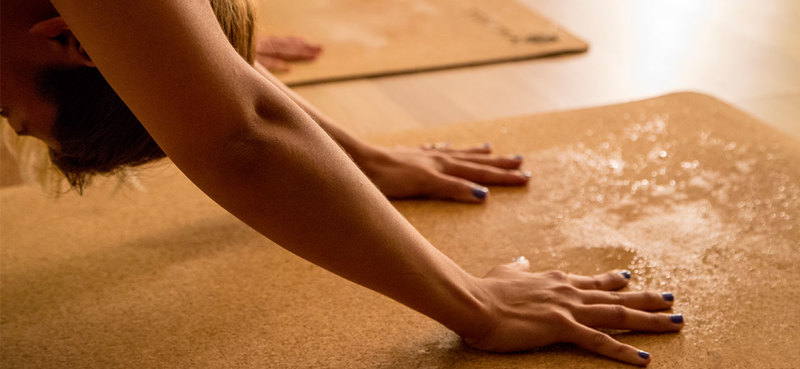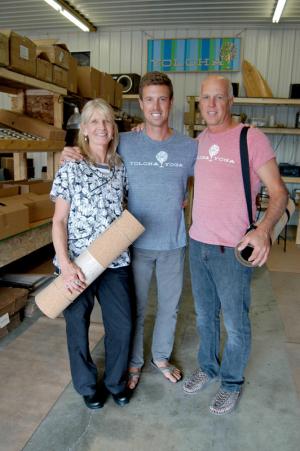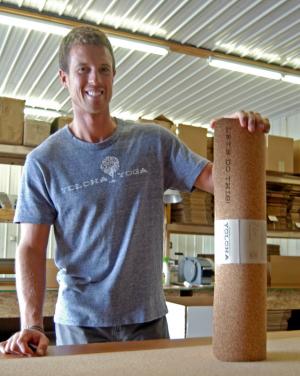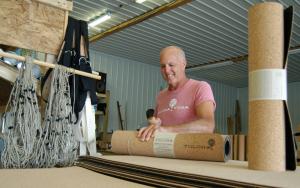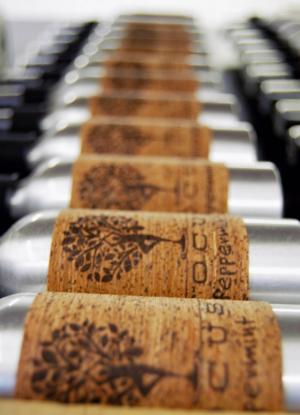Locally made. Sustainable. A focus on giving back.
Those sound like points a big corporation would tout in a marketing campaign, but for the family behind Milton-based Yoloha Yoga, there isn't any other way to do business.
“We don't have a trashcan in here. We just have recycling bins,” said Cliff Willey, standing in a new company warehouse. “We truly are about sustainability, and this truly is the most sustainable yoga product out there in the industry right now.”
The sustainable product was born of a mix of business and pleasure, as Cliff's oldest son, Chris, began experimenting with different materials to add grip to surf and paddle boards shortly after the family moved to Milton in 2004.
The Annapolis native and avid surfer eventually found cork, and continues to find new uses for the all-natural material. Because cork doesn't absorb water and contains suberin, a wax-like component that gives cork a better grip when it's wet. It was a no-brainer for Chris to ditch the environmentally-unfriendly wax that surfers usually use and start piling on the cork.
After carving waves with that grippy new surface, Chris found another new pastime that, as he explains in a video on Yolohayoga.com, provides the same euphoria as surfing: Yoga.
But when he started practicing more poses at a local studio, he found himself slipping and sliding all over the synthetic mat he was using in class. Recalling how well cork works on his boards, he decided to try it in a new setting.
Two years ago, the first 200 mats were made by hand on the floor of his family's garage and Chris brought a few mats with him to his local yoga class. As he watched the instructors scoop them up without giving a second thought to the plastic-smelling alternatives, Willey knew he had found a niche.
“The goal was to make it as sustainable as possible, using a recycled rubber tire backing to make it really work,” Chris said.
Joined by Cliff and his mother, Lisa, the family business has now outgrown its home base and moved to a warehouse just outside of Milton. There, Chris and Cliff work side-by-side packaging mats to ship to customers in California, Texas, Australia, Norway, Vietnam and all around the world.
“It's the professionals that really like the mats,” Cliff said. “They're using their mats all the time and the [synthetic mats] become a nasty, smelly mess. Every month they'd have to throw it out and get another one. This is a mat that will last.”
The new trend has yet to flood Delmarva, but the local surge is picking up in Baltimore.
“I don't think people realize it's a local business,” Cliff said. When Chris has taken the product to conferences or festivals in bigger cities, professionals are always taken back when they learn the innovative mats come from the First State – sometimes pausing to remember where exactly Delaware is.
“I get a blank stare for a couple seconds,” he said, laughing about the professionals he's met who thought the cork mats must be produced in California or Hawaii.
Soon, another Willey will join the Yoloha wave, when Chris's youngest brother Mike joins the production line. He'll help package and customize the mats, as well as Yoloha Yoga's other products, including bags and straps, yoga blocks, towels, paddle boards and even cork wallets. And with two engineers – Cliff and Mike – and Chris's graphic design background, the Willeys said they hope new products will be available in the near future.
International interest in the new product grew quickly enough that the Milton-based company now outsources some parts of production to companies along the East Coast, including the professional lamination of mats and locally printed labels.
Now the rubber-backed mats arrive in the Harbeson warehouse almost ready for shipping. All that's needed is personalization, an all-natural hemp carrying cord, and off they go. Customers shouldn't expect any kind of plastics to come along with the package: The Willeys are all about sustainability.
The cork mats are heavier and more expensive than the plastic, foam or PVC mats found in big box stores, but they are well worth the investment, the Willeys said. There's even the “giving cork mat,” which allows customers to purchase their own Yoloha Yoga mat as well as donating a mat to a child in need through the Holistic Life Foundation, a Baltimore-based nonprofit.
“Our mats are definitely more expensive, but out of that, you get the grip, you get a mat that's much longer lasting, and you don't have any of the toxic chemicals,” Chris said. “And you're supporting an American business.”
Cork is an anti-microbial material and relatively easy to clean, allowing the yoga mats to last for years with no more than some discoloration, Chris said.
The cork itself is a sustainable material, making it an attractive alternative for eco-conscious yogis. Cork comes from the bark of the cork oak, which is stripped from a mature tree every 9 to 12 years without causing damage to the tree itself. And as the tree works to regenerate its bark, it can store up to five times more carbon than an unharvested tree. A majority of the world's cork supply comes from Portugal, Chris said.
According to the Rainforest Alliance, as demand for cork increases, so do conservation efforts to keep the cork oak healthy and plentiful.
That's exactly what's at the heart of Yoloha Yoga's business model.
“We are a local company that makes awesome products,” Chris said. “Everything we make we pour time in. We put our heart and soul into it. If you buy from us, you know what you're getting.”
For more information about Yoloha Yoga, go to yolohayoga.com.














